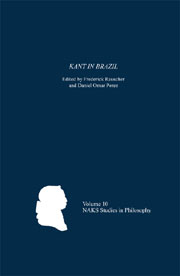Book contents
- Frontmatter
- Contents
- Acknowledgments
- Note on Sources and Abbreviations
- Introduction
- 1 Two Centuries of Kantian Studies in Brazil
- 2 Self-Consciousness and Objective Knowledge in the Transcendental Deduction of the Critique of Pure Reason
- 3 Intuitive Knowledge and De Re Thought
- 4 Predicative Judgments and Existential Judgments: Apropos Kant's Critique of the Cartesian Ontological Argument
- 5 An Experiment with Practical Reason
- 6 On the Faktum of Reason
- 7 Critique, Deduction, and the Fact of Reason
- 8 The Noncircular Deduction of the Categorical Imperative in Groundwork III
- 9 The Distinction between Right and Ethics in Kant's Philosophy
- 10 Right and the Duty to Resist, or Progress toward the Better
- 11 The Fundamental Problem of Kant's Juridical Semantics
- 12 Right, History, and Practical Schematism
- 13 Cosmopolitanism: Kant and Kantian Themes in International Relations
- 14 A Typology of Love in Kant's Philosophy
- 15 The Meaning of the Term Gemüt in Kant
- 16 Between Prescriptive Poetics and Philosophical Aesthetics
- 17 The Purposiveness of Taste: An Essay on the Role of Zweckmässigkeit in Kant's Critique of Aesthetic Judgment
- 18 Freedom in Appearance: Notes on Schiller and His Development of Kant's Aesthetics
- 19 Reading the Appendix to Kant's Critique of the Teleological Power of Judgment
- 20 Symbolization in Kant's Critical Philosophy
- Bibliography of Works in German and English
- List of Contributors
- Index
5 - An Experiment with Practical Reason
Published online by Cambridge University Press: 05 February 2013
- Frontmatter
- Contents
- Acknowledgments
- Note on Sources and Abbreviations
- Introduction
- 1 Two Centuries of Kantian Studies in Brazil
- 2 Self-Consciousness and Objective Knowledge in the Transcendental Deduction of the Critique of Pure Reason
- 3 Intuitive Knowledge and De Re Thought
- 4 Predicative Judgments and Existential Judgments: Apropos Kant's Critique of the Cartesian Ontological Argument
- 5 An Experiment with Practical Reason
- 6 On the Faktum of Reason
- 7 Critique, Deduction, and the Fact of Reason
- 8 The Noncircular Deduction of the Categorical Imperative in Groundwork III
- 9 The Distinction between Right and Ethics in Kant's Philosophy
- 10 Right and the Duty to Resist, or Progress toward the Better
- 11 The Fundamental Problem of Kant's Juridical Semantics
- 12 Right, History, and Practical Schematism
- 13 Cosmopolitanism: Kant and Kantian Themes in International Relations
- 14 A Typology of Love in Kant's Philosophy
- 15 The Meaning of the Term Gemüt in Kant
- 16 Between Prescriptive Poetics and Philosophical Aesthetics
- 17 The Purposiveness of Taste: An Essay on the Role of Zweckmässigkeit in Kant's Critique of Aesthetic Judgment
- 18 Freedom in Appearance: Notes on Schiller and His Development of Kant's Aesthetics
- 19 Reading the Appendix to Kant's Critique of the Teleological Power of Judgment
- 20 Symbolization in Kant's Critical Philosophy
- Bibliography of Works in German and English
- List of Contributors
- Index
Summary
This is the second part of a study on the handwritten corrections that I found in the original copy of the Kritik der praktischen Vernunft at the University of Erlangen-Nürnberg Library. Whereas the first part of that research resulted in a predominantly philological and historical investigation on those corrections taken as a whole, in this paper I focus on the philosophical meaning of a single correction, namely, the one on line 11 of page A166 of the original edition (Practical Reason, 5:93). There the word nur (only) was changed to nun (now), apparently with the intent of expressing more adequately the experiment with practical reason that Kant discusses in the passage.
With the help of Erlangen professors Jens Kulenkampf and Severin Koster (classical philologist), I obtained corroboration for a hypothetical dating of this particular change and others. Up until then the author of those corrections was unknown, and it was presumed that they had been made in the late eighteenth or early nineteenth century. The book, however, is signed by two previous owners, and the assumption was that their signatures were written down only much later, at the beginning of the twentieth century. Professor Koster was right about the first hypothesis, but not about the second. I found out that the signatures belonged to people who were Kant's contemporaries and belonged to his circle of relationships. I also found out that one of them, Paul Joachim Sigmund Vogel (1753–1834), was responsible for the corrections and had exchanged some correspondence with Kant.
- Type
- Chapter
- Information
- Kant in Brazil , pp. 98 - 108Publisher: Boydell & BrewerPrint publication year: 2012



